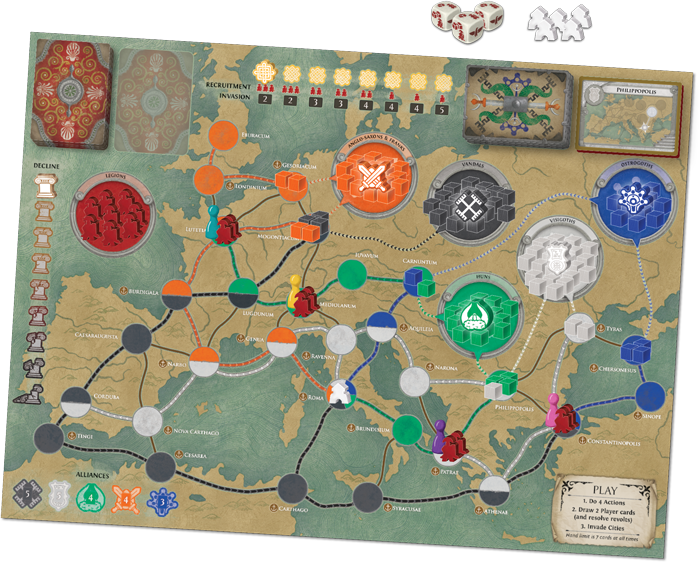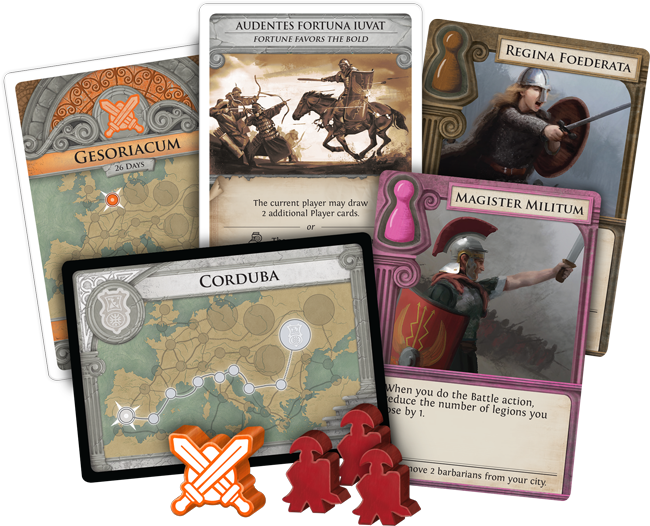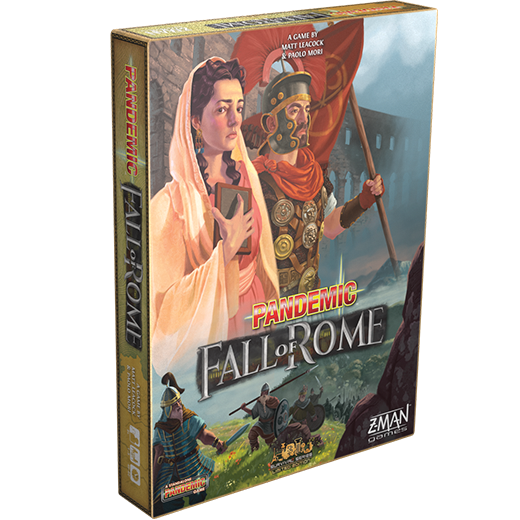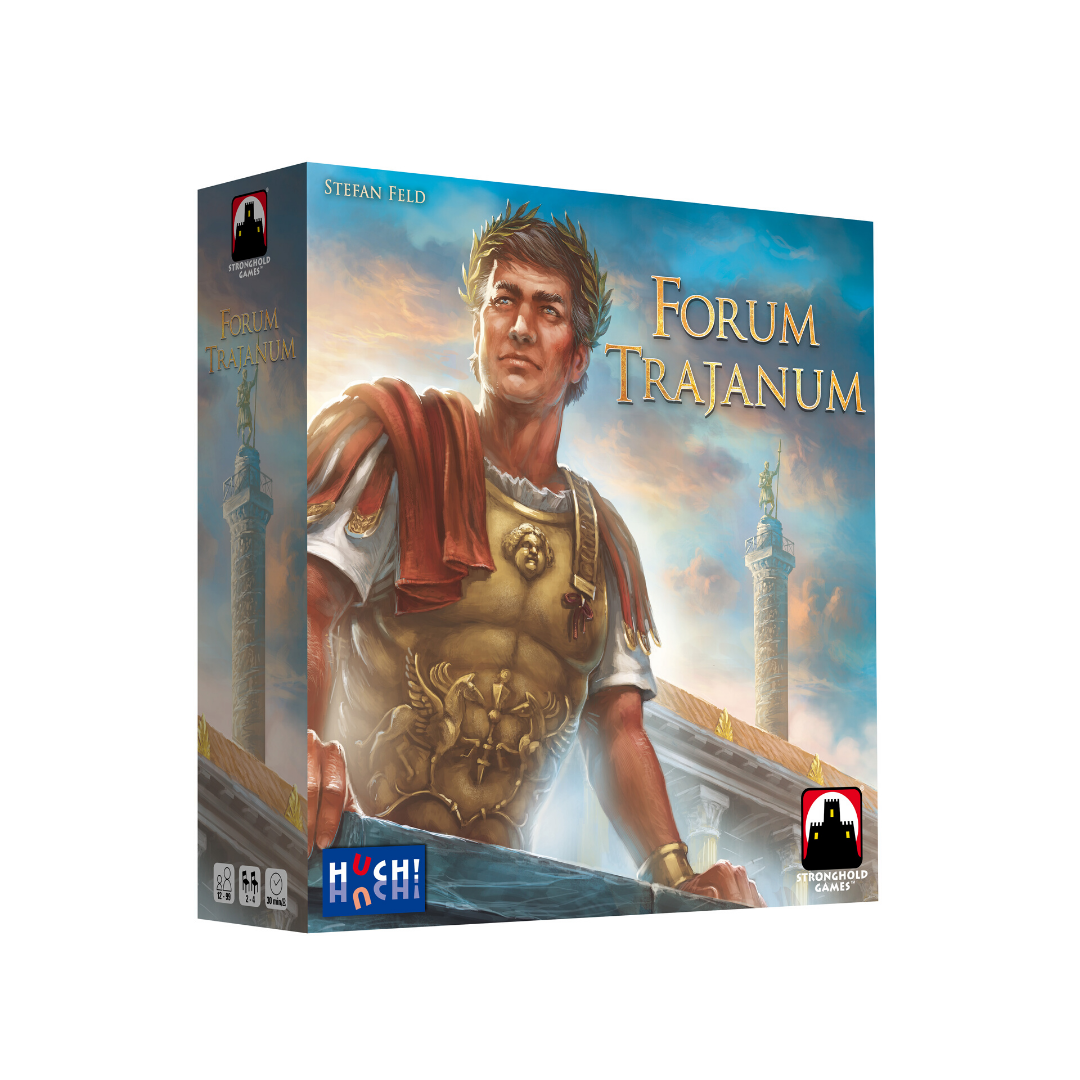"Beware the Ides of March" - Julius Caesar. Act 1, Scene 2
Fun fact: The ancient Romans didn't count the days of the month like we do, counting up from the first day to the last day. Instead they counted backwards from one of three fixed points in the month: The Nones, the Ides, and the Kalends. The date that the famous Ides of March refers to specifically is March 15th.
Needless to say, March has historically been a bad month to be in charge of Rome. But luckily, it doesn't have to be a bad month for board gamers! We’ve put together a list of some of our favourite Rome-themed games for those of you who enjoy delving into the history of the ancient empire as much as we do.
Want to know what's even better? All these games are currently at a reduced price!
So put on your toga and dive in!
Pandemic: Fall of Rome
Price: C$50.99
Players: 1-5
Ages: 8+
Playtime: 45-60 Min
The venerable Pandemic franchise has enjoyed over a decade of appreciation from board game fans around the world. Its popularity has birthed a dozen or so expansions and spin offs that have all provided a novel twist on the base concept of the cooperative virus-fighting that was the premise of the first game.
Pandemic: Fall of Rome, is perhaps one of the most unique of these spin offs, taking Pandemic’s conceit of a situation rapidly spiralling out of control and applying it to the fall of the Western Roman Empire.

Instead of exponentially multiplying cases of viral infection, Fall of Rome has the ever growing threat of barbarian hordes, amassing at the borders of the Empire before advancing to threaten the great city of Rome itself. With the barbarians at the gates, players are tasked with the defense of the Empire, spending the game raising armies, making alliances, and defending cities. No one player can save the Empire, and working in concert is integral to victory. The game will feel instantly familiar to veteran Pandemic players while at the same time introducing new mechanics to take advantage of the new setting and theme.
Much like other Pandemic titles, the game presents a significant challenge to new players. You’re not likely to win during your first game, but you’ll definitely have a blast trying.

And if you and your friends find yourself mastering the game, there are rules for making the game even harder such as adding the rule that Legions (your armies) are barred from entering the city of Rome (a rule based on an actual ancient Roman law that prohibited large groups of armed soldiers in the capital).
Try your hand at averting the disaster that the Romans themselves couldn’t.
Trajan
Price: C$49.25
Players: 2-4
Ages: 12+
Playtime: 60-120 Min
Few figures dominate Roman history like the Emperor Trajan. In addition to expanding the Empire’s borders even further than his predecessors, Trajan was also committed to creating great public works. His reign saw the renovation of the capital city with new buildings and the development of social-welfare programs for Rome’s needy. No wonder, he got his own board game!

The game takes place in the optimistic era of Trajan’s rule (circa 100 CE), with players competing to help construct and expand the Empire. Similar to games such as Terra Mystica, Trajan uses “bowls” in which each player places pieces to plan out the actions that they will execute on a given turn. Depending on how you plan out your turn, you’ll find yourself building public works, trading goods, expanding your military might, and currying favor in the senate, among other tasks that will earn you the victory points to win a game.

Its innovative design ensured that Trajan earned a plethora of nominations and awards when it came out. Solid euro style mechanics combined with a focus on forward planning, really captures the feeling of being a member of the Roman elite, using your wits and deft maneuvering to anticipate the board state before it emerges.
A must-add to the collection of any board gamer who enjoys in depth strategy and clever play.
Concordia
Price: C$50.40
Players: 2-5
Ages: 13+
Playtime: 100 Min
While Rome may have been famed for its military might, at its height it was also a tremendous feat of logistics. Force of arms may have built the Empire, but it was trade that comprised its lifeblood. By some estimates, the city of Rome itself needed around 200,000 tonnes of grain EACH YEAR to support its population, and that grain had to come from somewhere.
/pic1797926.jpg)
In Concordia, you enter into the complex world of Roman trade, doing your level best to corner the market on some of the many commodities that built the wealth of the Empire. Players will take turns placing their workers and trading posts amongst the many lucrative regions of the Roman Empire. Each region produces different commodities (determined randomly during setup) that can be collected by players. SInce each trade route can only hold one worker at a time, space is competitive, and players must race to secure the trading routes and cities that are the most valuable. Players can also sell their goods and collect coin in order to purchase “personality” cards from the table that will help improve their operation. These cards are also associated with various Roman guards, and at the end of the game the gods that each player holds determines how they score their final victory points.
/pic1788446.jpg)
The joy of Concordia is in its straightforward simplicity. Whereas Trajan’s complexity makes it ideal for veteran gamers and those who like crunchy mechanics, Concordia is the game for those who always wanted to get into euro-style games but found the genre unfriendly to newcomers (which isn’t the unfairest assessment). Even for those who are veterans of the worker placement or old masters of the victory point, Concordia is the perfect game to shake up a night of big, rules heavy games with a more friendly affair that retains enough of a competitive edge to sate those in the group who relish a challenge.
/pic1772003.jpg)
Concordia also boasts several excellent expansions. These include several board map expansions that let you play in various regions in the Roman Empire (Baerica/Cyprus, Aegyptus/Creta, Gallia/Corsica, Britannia/Germanis), as well as two boxed expansions: Concordia: Salsa which adds salt as unique and valuable commodity, and Concordia: Venus which adds new personality cards centered around the goddess Venus.
Forum Trajan
Price: C$46.73
Players: 2-4
Ages: 12+
Playtime: 40-60 Min
Look at that! This is the second game on this list to feature Ol’ Trajy. We weren’t kidding when we said he was an important historical figure. In contrast to the game of Trajan described above, which takes a holistic view of the Roman Empire during the time of the eponymous emperor, Forum Trajanum is focused on one of his specific accomplishments, known as, well, er… Trajan’s Forum.
So okay! Maybe Roman’s weren’t the most creative namers of things. Still, the construction of a new forum was a big deal in Ancient Rome. Forums formed the center of public life in the capital, acting as a public square where vendors could set up their shops, goods could be brought to market, and political gatherings and debates could take place. Trajan’s Forum is also the location of the famous Trajan’s Column (again, with the naming!) which honoured Trajan’s victory over the Dacians.
/pic4272074.png)
In Forum Trajanum, players find themselves filling the shoes of governors of the colonia (new settlements in Roman conquered territory). Players must work to build their colonia into proper Roman cities, while also balancing the need to contribute to the massive project that is the construction of Trajan’s Forum. The game is played over three cycles (represented by the construction of Trajan’s Column, which is an actual game piece that players stack an additional segment on whenever a cycle ends), scoring victory points on the end of each based on: the structures you have built in your colonia, the citizens in your colonia, and the number of envoys you sent to aid in the construction of the Forum. The player with the most victory points at the end wins!
/pic4267614.jpg)
There are many strategies that a player can pursue, and balancing one’s focus on building their own colonia without neglecting the communal work of building the Forum is a puzzle that each player will bring their own approach to. The feeling of being pulled between focusing on your own corner of the world while also struggling with the social obligation to contribute to the Emperor's pet project, really lets you get into the character of a put-upon Roman official.
Despite the similar name, this is a very different title than Trajan. If you have a hankering for some Roman construction, this is your game.
We hope that the Ides of March find you better then they did Caesar. All roads may lead to Rome, but we know of at least one that actually leads to us: Mission: Fun & Games. Online or in-store, we aim to bring you the best games of every theme and genre. Get your Roman on with these and other amazing titles available on our website!




/pic4336095.png)




